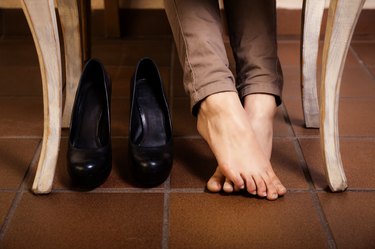
About 75 percent of Americans will experience foot pain at some point, according to Beth Israel Deaconess Medical Center. Foot pain can be caused by anything from poor posture to poor balance to inactivity; however, not all foot pain is attributed to obvious physical causes. Pain in the feet can also occur due to too much calcium as well as too little calcium that has developed into osteoporosis. Taking too much calcium can cause severe damage to the body and not taking enough can have a similar effect.
Calcium Requirements
Video of the Day
Adult men and women are required to consume at least 1,000 milligrams of calcium per day, according to Harvard Health Publications. This amount increases to 1,200 milligrams older than the age of 50. Dairy products such as milk and yogurt contain calcium and vitamin D. Vitamin D, found in dairy products, is used to help increase calcium absorption and also helps your body use calcium properly.
Video of the Day
Calcium Deficiency
Calcium deficiency occurs when there is an inadequate intake of calcium. This can arise from poor nutrition or medical conditions such as menopause, which causes the bones to become thin. Aging may also contribute to a calcium deficiency if the recommended daily allowance of calcium is not consumed. In the beginning, calcium deficiency causes no symptoms; however, untreated calcium deficiency may become osteoporosis. Symptoms of osteoporosis are bone pain and joint pain, as well as fractures sustained with little impact.
Calcium Overdose
Calcium overdose occurs if too many calcium supplements or multivitamins containing calcium is taken in a short amount of time or in large amounts over an extended amount of time. Calcium overdose is usually non-lethal and people make a good recovery after treatment, according to Medline Plus. Symptoms of calcium overdose are severe headache, abdominal pain, muscle pain, bone pain, nausea, vomiting, diarrhea, dizziness, and extreme fatigue. The muscle or bone pain associated with calcium overdose can be felt in any part of the body including the feet.
Consideration
If you are susceptible to calcium deficiency your physician may suggest that you take calcium supplements or multivitamins that contain calcium available over-the-counter. Eat calcium rich foods such as green leafy vegetables, broccoli, low-fat yogurt or low-fat milk. When attaining calcium and vitamin D from dairy sources, stick to low-fat or no-fat options to reduce the risk of developing high cholesterol. If you think you need calcium supplements to prevent a deficiency, consult your doctor -- they can recommend a safe dosage unlikely to cause a calcium overdose.